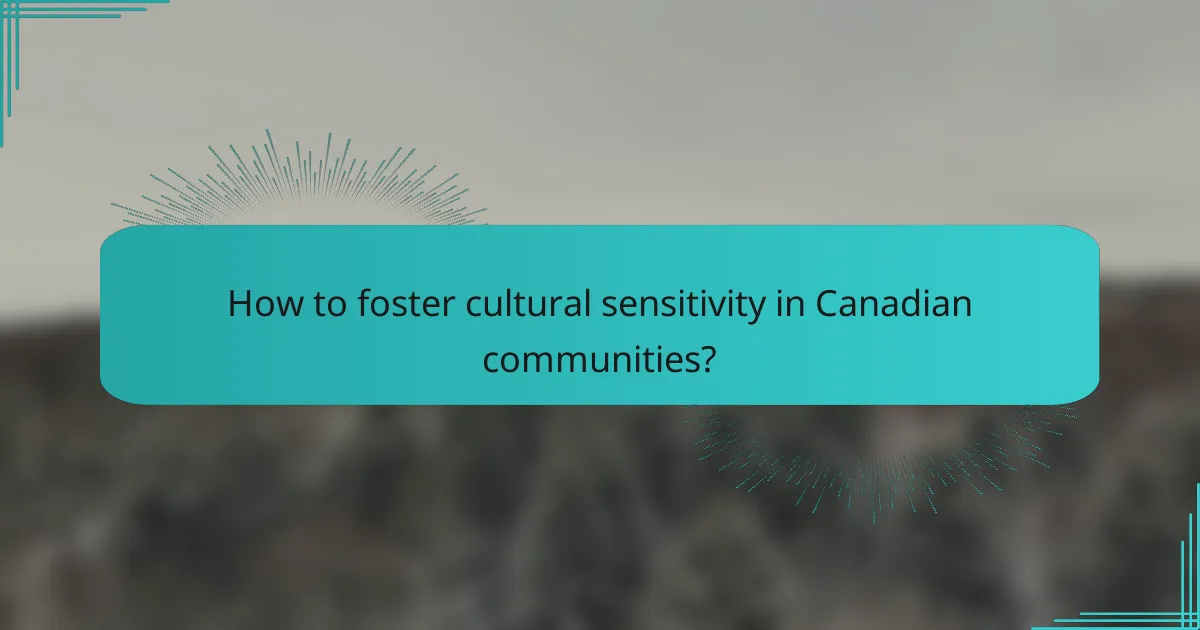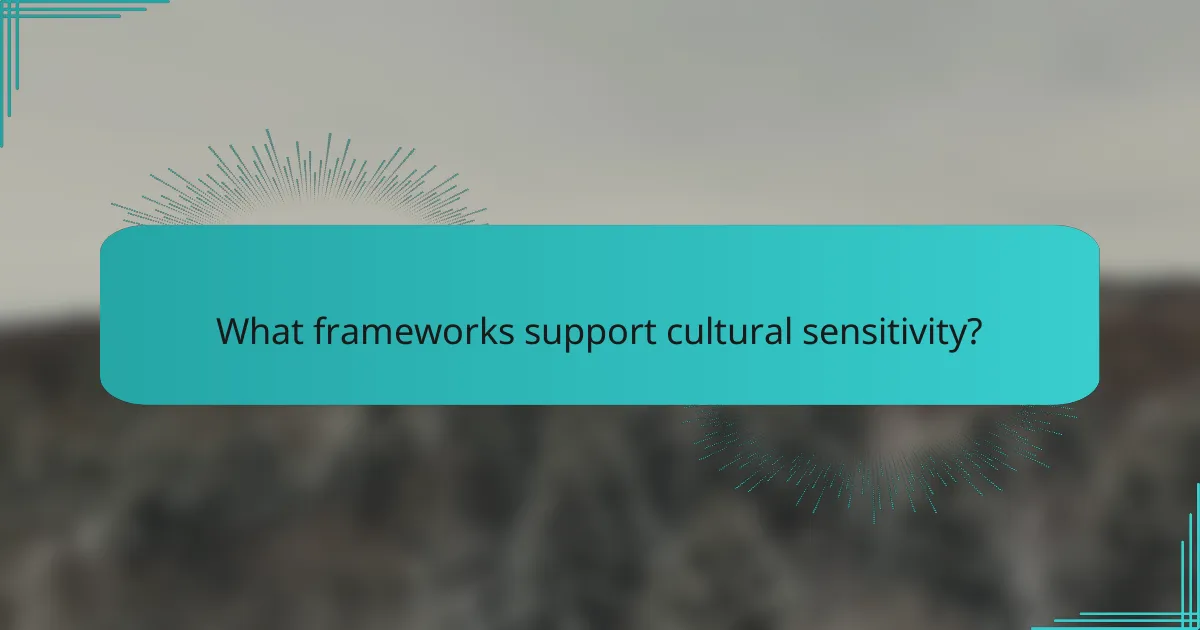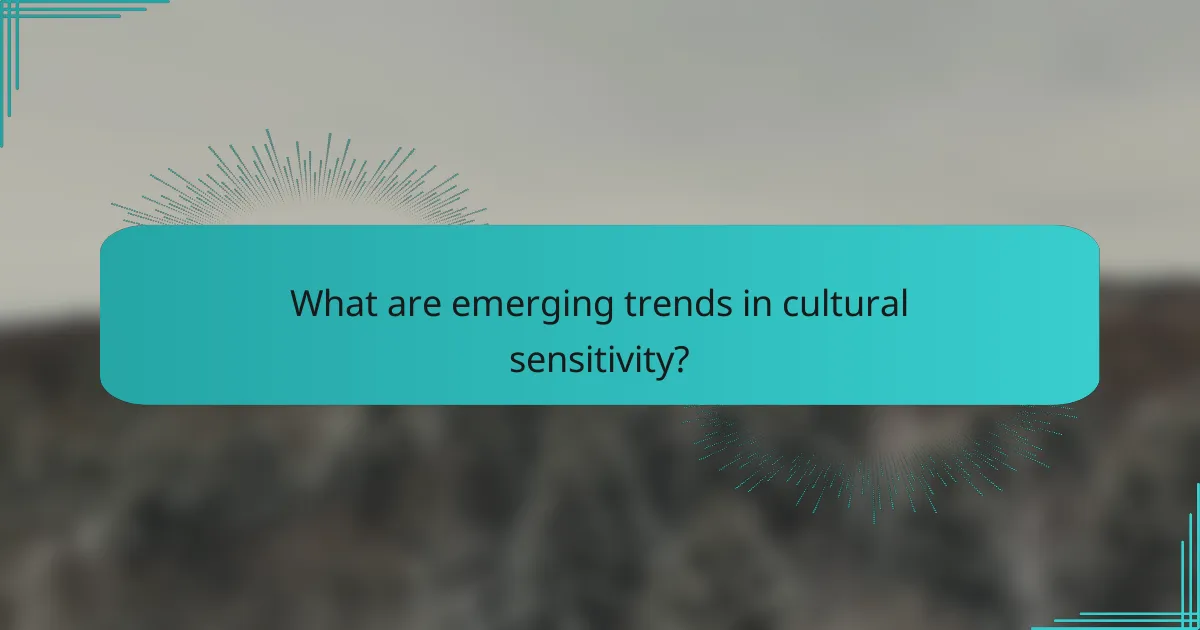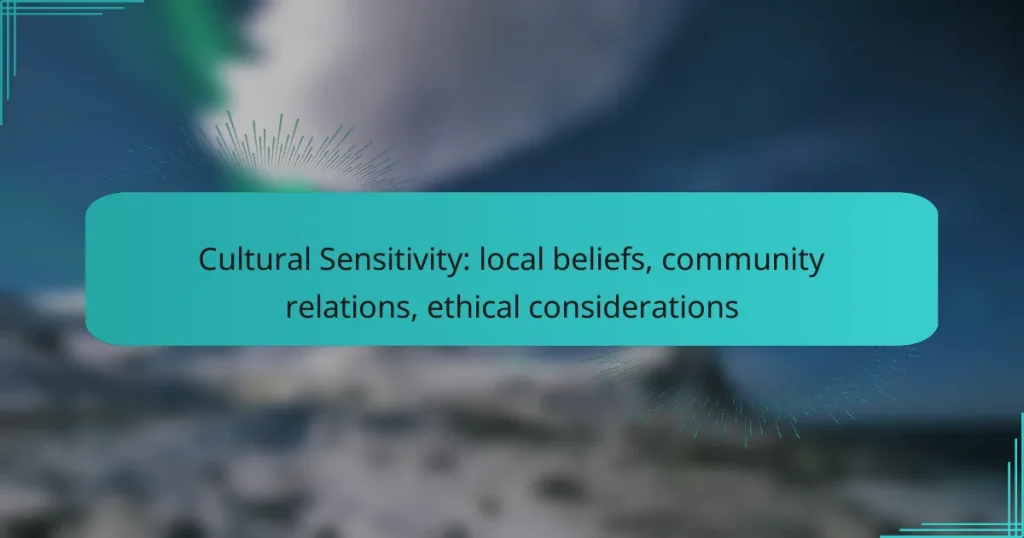Cultural sensitivity is crucial in fostering harmonious relationships within Canadian communities, particularly in recognizing and respecting the diverse backgrounds of Indigenous peoples. By engaging with local beliefs and promoting education and collaboration, communities can enhance trust and understanding, ultimately leading to stronger social interactions and community relations.

How to foster cultural sensitivity in Canadian communities?
Fostering cultural sensitivity in Canadian communities involves understanding and respecting diverse cultural backgrounds, particularly those of Indigenous peoples. Engaging with local communities and promoting awareness through education and collaboration are essential steps in this process.
Engage with local Indigenous groups
Engaging with local Indigenous groups is crucial for fostering cultural sensitivity. This can include attending community events, listening to their stories, and understanding their traditions and values. Building relationships based on trust and respect can lead to more meaningful interactions.
Consider forming partnerships with Indigenous organizations to facilitate discussions and workshops. This collaboration can help bridge cultural gaps and promote mutual understanding. Always approach these engagements with an open mind and a willingness to learn.
Implement community workshops
Community workshops are an effective way to educate residents about cultural sensitivity. These workshops can cover topics such as local history, cultural practices, and the importance of diversity. Aim for interactive sessions that encourage participation and dialogue among attendees.
When organizing workshops, consider collaborating with cultural experts or community leaders to ensure accurate representation. Providing resources and materials in multiple languages can also enhance accessibility and inclusivity.
Promote cultural exchange programs
Cultural exchange programs allow community members to experience and appreciate different cultures firsthand. These programs can include art exhibitions, culinary events, or language classes that showcase the richness of various cultural backgrounds. They foster appreciation and respect among diverse groups.
To implement successful exchange programs, seek partnerships with local cultural organizations and schools. Encourage participation from all community members, and consider offering financial support or incentives to increase engagement. This approach can help build a more cohesive and culturally aware community.

What are the key local beliefs in Canada?
Key local beliefs in Canada emphasize respect for Indigenous cultures, the value of multiculturalism, and the importance of community involvement. These beliefs shape social interactions and community relations across the country.
Respect for Indigenous traditions
Respecting Indigenous traditions is fundamental in Canada, where numerous First Nations, Métis, and Inuit communities exist. Acknowledging their histories, languages, and customs is essential for fostering positive relationships and understanding.
Engaging with Indigenous communities often involves participating in cultural events, learning about traditional practices, and recognizing land rights. This respect can help bridge gaps and promote reconciliation efforts.
Value of multiculturalism
Canada’s identity is deeply rooted in multiculturalism, which celebrates the coexistence of diverse cultures and ethnicities. This belief encourages acceptance and appreciation of different backgrounds, fostering a sense of belonging for all residents.
Practically, this means supporting cultural festivals, language preservation, and inclusive policies. Communities often benefit from initiatives that promote intercultural dialogue and understanding, enhancing social cohesion.
Importance of community involvement
Community involvement is a cornerstone of Canadian society, emphasizing the role of individuals in shaping their neighborhoods. Active participation in local events, volunteer opportunities, and civic engagement strengthens community ties and fosters a sense of responsibility.
To encourage involvement, communities can create accessible platforms for residents to voice their opinions and contribute to decision-making. This can include town hall meetings, local committees, and volunteer programs that invite diverse participation.

How to build positive community relations?
Building positive community relations involves fostering trust and understanding between organizations and local communities. Key strategies include encouraging open dialogue, supporting local initiatives, and collaborating with community leaders.
Encourage open dialogue
Open dialogue is essential for establishing trust within a community. Create forums or regular meetings where community members can express their concerns and ideas freely. This two-way communication helps to identify community needs and fosters a sense of belonging.
Consider using various platforms for dialogue, such as social media, community boards, or local events. Ensure that feedback is acknowledged and acted upon, which demonstrates that the community’s voice is valued.
Support local initiatives
Supporting local initiatives shows commitment to the community’s well-being and development. This can include sponsoring local events, funding educational programs, or partnering with local businesses. Such support not only benefits the community but also enhances your organization’s reputation.
Identify initiatives that align with your organization’s values and mission. For example, if your organization focuses on environmental sustainability, consider supporting community clean-up events or tree-planting campaigns.
Collaborate with community leaders
Collaboration with community leaders is vital for effective engagement. Leaders can provide insights into community dynamics and help bridge gaps between your organization and local residents. Building relationships with these figures can facilitate smoother communication and collaboration.
Engage with leaders through regular meetings, joint projects, or advisory boards. This partnership can lead to more impactful initiatives and strengthen community ties, ultimately benefiting both the organization and the community as a whole.

What ethical considerations should be made?
Ethical considerations in cultural sensitivity focus on respecting local beliefs and fostering positive community relations. Key aspects include informed consent, addressing power dynamics, and ensuring equitable representation.
Prioritize informed consent
Informed consent is crucial when engaging with communities, as it ensures that individuals understand the purpose and implications of their participation. This process involves clearly communicating the goals of any project or research and allowing community members to ask questions before agreeing to participate.
To effectively obtain informed consent, consider using simple language and culturally relevant materials. Providing information in the local language can enhance understanding and trust, making community members feel valued and respected.
Address power dynamics
Power dynamics often influence interactions between outsiders and local communities. Recognizing these dynamics is essential to avoid exploitation and ensure that community voices are heard. This may involve acknowledging historical injustices and current inequalities that affect community members.
Engaging local leaders and stakeholders can help balance power dynamics. Collaborating with trusted community figures fosters a sense of ownership and encourages more equitable participation in decision-making processes.
Ensure equitable representation
Equitable representation means including diverse voices from the community, particularly marginalized groups. This approach helps to capture a fuller picture of local beliefs and practices, ensuring that no single perspective dominates the narrative.
To achieve equitable representation, actively seek input from various community segments, including women, youth, and minority groups. This can be done through focus groups, surveys, or community meetings, ensuring that all voices have an opportunity to contribute.

What frameworks support cultural sensitivity?
Frameworks that support cultural sensitivity include structured approaches like cultural competence training and diversity and inclusion policies. These frameworks help organizations and individuals understand and respect diverse cultural backgrounds, fostering better community relations and ethical interactions.
Cultural competence training
Cultural competence training equips individuals with the skills to interact effectively with people from various cultural backgrounds. This training typically covers topics such as communication styles, cultural norms, and the impact of bias, enabling participants to navigate cultural differences more adeptly.
Organizations often implement this training through workshops or online courses, which can range from a few hours to several days. For example, a company might offer a half-day workshop focusing on local cultural practices relevant to their workforce, enhancing overall workplace harmony.
Diversity and inclusion policies
Diversity and inclusion policies are formal guidelines that promote equitable treatment and opportunities for all individuals, regardless of their cultural background. These policies often outline the organization’s commitment to fostering a diverse environment and may include specific goals for recruitment, retention, and promotion of underrepresented groups.
Effective policies should be regularly reviewed and updated based on feedback and changing demographics. For instance, a business might set a goal to increase the representation of minority groups in leadership roles by a certain percentage over a defined period, ensuring accountability and progress.

How to measure cultural sensitivity effectiveness?
Measuring cultural sensitivity effectiveness involves assessing how well an organization understands and respects local beliefs and community relations. This can be achieved through various methods that gauge the impact of cultural practices on community interactions and ethical considerations.
Community feedback surveys
Community feedback surveys are a direct way to measure cultural sensitivity by collecting opinions from local residents. These surveys should include questions about their perceptions of the organization’s respect for local customs and values.
To ensure effectiveness, design surveys with a mix of quantitative and qualitative questions. For example, ask respondents to rate their agreement with statements about cultural respect on a scale from 1 to 5, followed by open-ended questions for detailed feedback.
Regularly conducting these surveys, perhaps annually or biannually, allows organizations to track changes in community sentiment over time and adjust strategies accordingly.
Impact assessments
Impact assessments evaluate the effects of an organization’s actions on local communities and their cultural practices. This process involves analyzing both positive and negative outcomes related to community relations and ethical considerations.
When conducting an impact assessment, consider factors such as changes in community engagement, economic effects, and shifts in cultural practices. Engaging local stakeholders in this process can provide valuable insights and enhance the assessment’s credibility.
Utilizing established frameworks, such as the Social Impact Assessment (SIA) guidelines, can help ensure a comprehensive evaluation. Regular assessments, ideally every few years, can help organizations remain aligned with community expectations and cultural sensitivities.

What are emerging trends in cultural sensitivity?
Emerging trends in cultural sensitivity focus on increasing awareness and understanding of diverse cultural backgrounds in various settings. This includes recognizing local beliefs, fostering community relations, and addressing ethical considerations in interactions.
Local beliefs
Understanding local beliefs is crucial for effective communication and relationship-building. These beliefs often shape community values, traditions, and social norms. For example, in many Indigenous cultures, land is viewed as sacred, influencing how community members interact with their environment.
To engage respectfully, consider researching the cultural context before interactions. This can involve learning about local customs, traditions, and historical events that shape community perspectives. Avoid making assumptions based on your own cultural background.
Community relations
Building strong community relations requires active listening and genuine engagement with local populations. This involves recognizing the importance of community leaders and influencers who can facilitate dialogue and understanding. Establishing trust is essential for successful collaboration.
Participating in local events or initiatives can enhance relationships. For instance, volunteering for community projects or attending cultural festivals demonstrates commitment and respect for local traditions. Always approach these interactions with humility and openness.
Ethical considerations
Ethical considerations in cultural sensitivity involve respecting the rights and dignity of individuals and communities. This includes being aware of power dynamics and ensuring that marginalized voices are heard and valued. Ethical practices foster inclusivity and promote social justice.
When conducting research or engaging with communities, prioritize informed consent and transparency. Clearly communicate your intentions and how the information will be used. Avoid exploiting cultural knowledge for personal or commercial gain, and always give credit where it is due.


